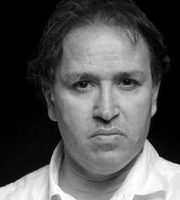by Khaled Mattawa
Today the date palms were pruned,
the branches taken before the fruit ripened,
before sweetness littered the sidewalks.
The man who sawed them worked alone,
a crane lifting him to the yellowed fronds.
Beside his truck, he stood tall, American,
a pensive pioneer. The top of each palm
looked like the back of a man's head
after a close-crop haircut, the neck
cooled to a stubbly remembrance of hair,
or was like a cat after being spayed,
startled by a strange newness, pacing
familiar rooms, darting, confused, and you
(had you wished to console) are greeted
with a barren gaze. The rubble of bark
and fronds reminded me of Iraq,
not the ruined bridges, or the surrendering
soldiers' hands begging food, but the 16 million
date palms, one per capita, lining
the seams of the Tigris and Euphrates,
a reminder of my own Libya
and its 10 million date palms and the years
of easy wealth that brought them neglect
except in Huun, a magical city where
they stuffed dates with almonds and sent them
as far as Tanta and Oum Dourman.
From Huun this story: a boy stands by a palm
imploring his uncle to toss him a fistful of dates.
Flustered by the boy's monotonous cries
the uncle loses his feet, and as he falls
to his death, cries down "Here nephew,
I'm coming down with the dates!"
So that's what we got from Huun, almond
stuffed wonders and proverbial last words.
There was another reminder, a tale
of the prophet Muhammad living for months
on water and coarse wheat bread, his wives
protesting the austere measures of his faith.
Muhammad, who praised honey and had
a professed love for cantaloupes, and who once
declared "the best meat is that which lines the bones,"
found in dates the solution he required.
To his Arab followers, and to his wives,
the fruit was "three skies above luxury,"
and as indispensable as water and air.
I once had this dream of Whitman:
I found him under one of the palms
on Sherman Way gazing admiring.
Though he had seen palms by the Gulf of Mexico,
he had never tasted a date. So we drove
to a supermarket, and he who had been
thoughtful, even dignified, until then, began
to sign and moan at the taste of "Araby's
sugared dust clouds." When we walked
the aisles he insisted on pushing the cart.
The frozen foods did not surprise him since
his Granny buried potatoes in the cold dirt
of her homestead. Still I had to explain
tofu, plastic, tacos, and the foods labeled free.
He ran his hands caressing the waxed floor;
"Smooth as a girl's wrist," he exclaimed.
The bright fluorescent lights reminded hirn
of the opera, and Walt sang a gravelly tune.
The children sitting in carts reached for him,
their hands were Lorca's butterflies on his beard.
At the cashier he filled pockets with candy,
and was shocked by the headlines of our news.
Honda, Toyota, Saturn, Oldsmobile—
in the parking lot the names waltzed
on his tongue. At the fast food stand he ate
heartily, the burger's slipperiness amused him,
and at his clumsiness we both had a laugh.
Then the talk grew quiet, the table stretching
like the expanse of time dividing us; I felt
he no longer wanted company, having begun
to understand our world. Despite his old resentment
of Blacks, and now my neighbors, the foreign-born
Hispanics and their engines roaring through
Balboa and Saticoy, and the Koreans' karoake—
the baseline's muffled thuds, voices doused
in Canadian Mist, and the off-key pleadings
to the lover who never comes—, America
remained to him luminous-industrial-fuming-
sublime, and as he wished, beyond others'
adjectives, beyond what anyone could have conceived.
Mumbling a farewell, Whitman stood to leave.
And with this my dream ended, Whitman wishing
to depart and I holding on to his wrists.
All day I wanted to hold his wide wrists.
If you drive west of Alexandria
your path will run through Alamain,
Barani, and Matrouh. Then Egypt will end
with a town on a steep hill called Sallum.
If you go through the two checkpoints,
Libya will unfold its dry pastures for you.
On the Sallum hill there is a hotel
where people stay to await relatives
crossing the border or to hear word
if it is safe to return. Across the road
a tired bluegreen tea house sits
like a bruise permanently on the verge
of fading from the prairies' skin.
You will also see the money changers—
all teenage boys. With their right hands
they will wave thick wads of money
at your windshield, and with their left
they will jostle to give you the best rate.
The last time I stayed in Sallum
few cars came from either direction,
and among the boys fights flared
with curses and stones hurled at brows.
When the boys' rabble grew loud
a man lazily stepped out of the tea house
to call them bastards and sons of whores.
This went on for hours until
the sun settled in the middle of the sky,
the boys taking shelter under
a torn canvas shed, and the man
to the tea house's dusty cool.
Then just when all movement
and noise seemed to surrender
to the September wind and heat,
four of the boys broke for a run
racing—money still clutched in their hands—
to a young date palm in the distance.
Pressing shoulders and backs against it,
they shook the palm until the season's
first fruit began to rain. The other boys
joined them, and soon the tea house
emptied of the men slouching inside.
Those were my brothers who cowered beneath
the date palm to gather handfuls of fruit,
rubbing each date clean on their sleeves,
chewing softly to savor the taste
as though it were a good omen, and rising
to resume their lives, on their faces
the smiles of those who once were blessed.
Last updated June 28, 2015




